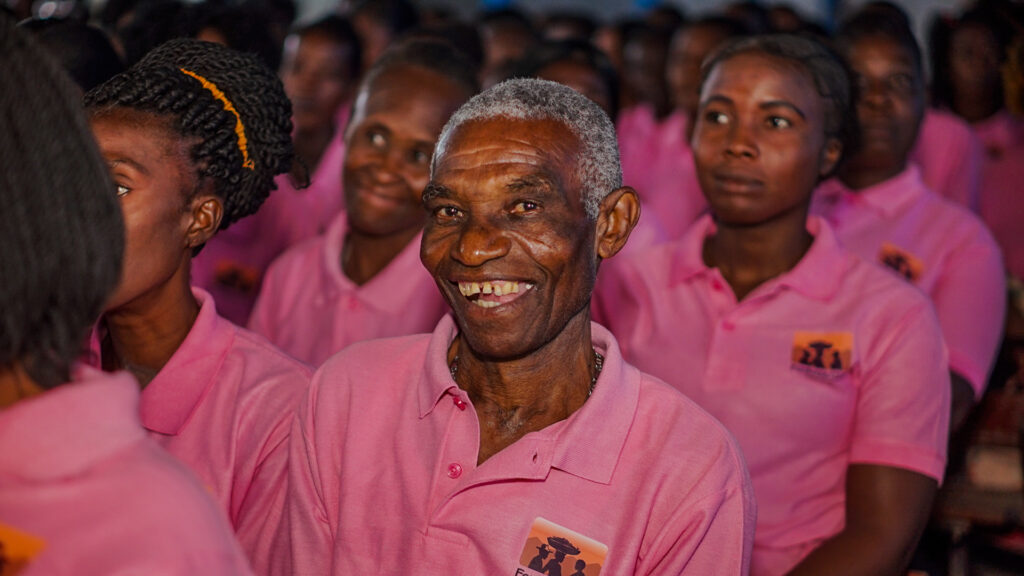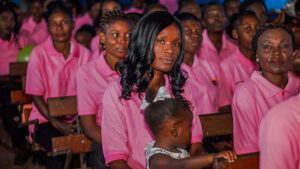How Fonkoze’s CLM Program in Haiti is Evolving to Address Gender Inequities
From 2018 to 2022, Fonkoze conducted independent studies of Chemen Lavi Miyò (CLM), its adaptation of the BRAC graduation program, to better understand its impact and identify growth opportunities. These studies drew significant conclusions about gender equity, revealing both the program’s successes and areas where it could be further enhanced.
The first study, conducted by Haitian feminist Sandra Jean-Gilles, documented how CLM’s success in increasing women’s economic empowerment was often met with resistance from their partners and, at times, the broader community (Jean-Gilles, 2019). The second study, by Dutch development expert Keetie Roelen, showed how the heavy caregiving responsibilities borne by women hindered their ability to fully benefit from the program’s support (Roelen, 2019; Roelen et al., 2022).
These findings prompted Fonkoze to rethink and adapt CLM with three key objectives in mind:
- Cultivating women’s agency by building their critical consciousness regarding gender relations, encouraging goal-setting, and enhancing their decision-making power.
- Addressing the unequal caregiving workload placed on women by making it a priority from the program’s start.
- Confronting traditional masculinities through targeted interventions with members and their partners to reshape gender norms.
To address these issues, Fonkoze, with support from the Swiss Embassy, piloted a series of new or modified measures in Haiti’s Southeast region. Over the course of four years, the team worked to place women’s empowerment at the heart of the CLM program and introduced training aimed at transforming masculinities among both participants and their partners.
Empowering Women and Redefining Gender Roles
Focusing on women’s empowerment required extensive retraining of staff and redesigning program measures to increase flexibility, allowing participants to make more informed choices. A key part of this shift was reworking the “confidence-building training” module to introduce critical consciousness earlier in the program’s 18-month curriculum. Additionally, Fonkoze established indicators to track empowerment and guide future program improvements.
To address masculinities, Fonkoze made a concerted effort to engage men as active participants. Often, male partners viewed the program as something solely for women, but Fonkoze worked to integrate men into the process through coaching sessions and group workshops. The goal was to foster mutual respect and collaboration between partners, helping to break down rigid gender roles.
Positive Results and Lasting Change
The new measures yielded positive feedback from both women and men involved in the program. One woman reflected on how the confidence-building training changed her mindset: “I always doubted. I would say I wanted to do something but then wonder if it was possible. Thanks to the training, I now believe in myself. I know why I am doing what I do. I don’t just listen to others anymore—I listen to myself first.”
Women also reported improved relationships with their husbands. One woman shared, “The training changed the husbands a lot. I used to be the one to take responsibility, but now he takes responsibility too. Now, when we make a decision, we make it together. And it’s different for the children too. Now, if I have to leave early, he makes sure they get to school.”
Husbands, too, noticed significant changes in their relationships. One man said, “My relationship with my wife before CLM and after CLM is different. We used to live together, but neither of us really understood the other’s role. CLM showed us how important each person is to the other. A wife isn’t worth more than her husband, and a husband isn’t worth more than his wife. Just as a husband can make a decision, a wife can make a decision too.”
Scaling the Impact Across Haiti
Building on the success of the Southeast pilot, Fonkoze is now poised to scale these changes across its CLM program throughout Haiti in late 2024 and 2025. The expansion will include new training focused on women’s empowerment and transforming masculinities, as well as the introduction of modified training modules for families. Additionally, Fonkoze will integrate new indicators for empowerment into its standard data collection regimen, ensuring that these efforts are measured and continuously improved.
The work Fonkoze has done to reimagine the CLM program is transforming not just individual lives, but also the broader social fabric of Haiti. By focusing on gender equity, challenging traditional norms, and fostering greater collaboration within families, Fonkoze is creating a more just and equitable future for all.
To support Fonkoze’s ongoing efforts to bring these transformative measures to more families across Haiti in the coming year, please contact us.






